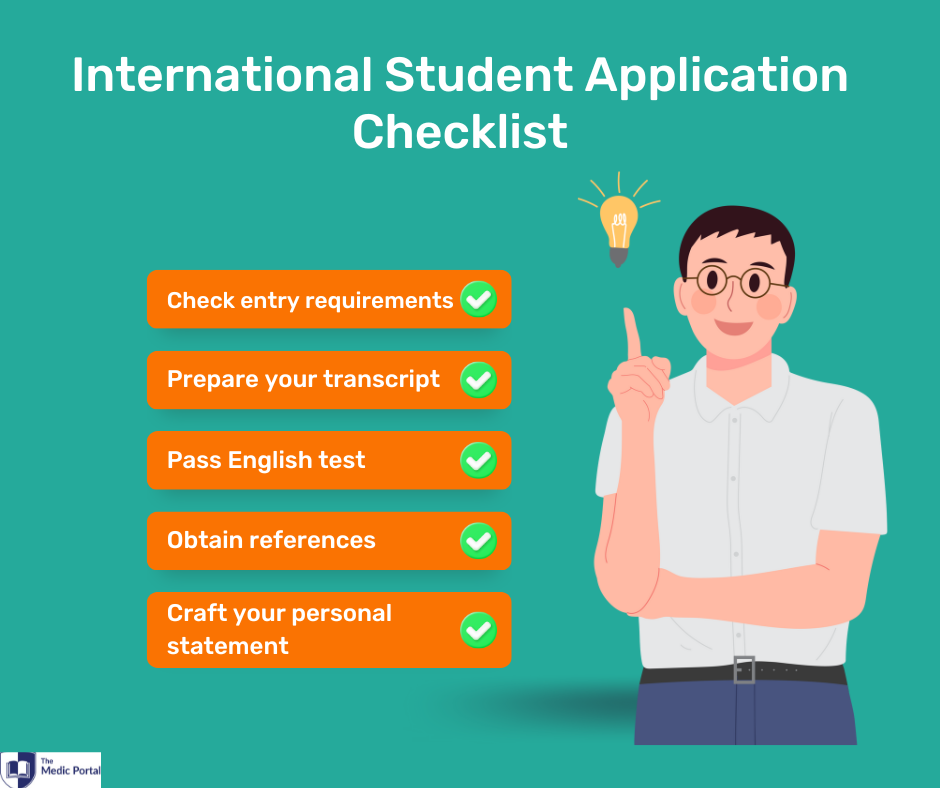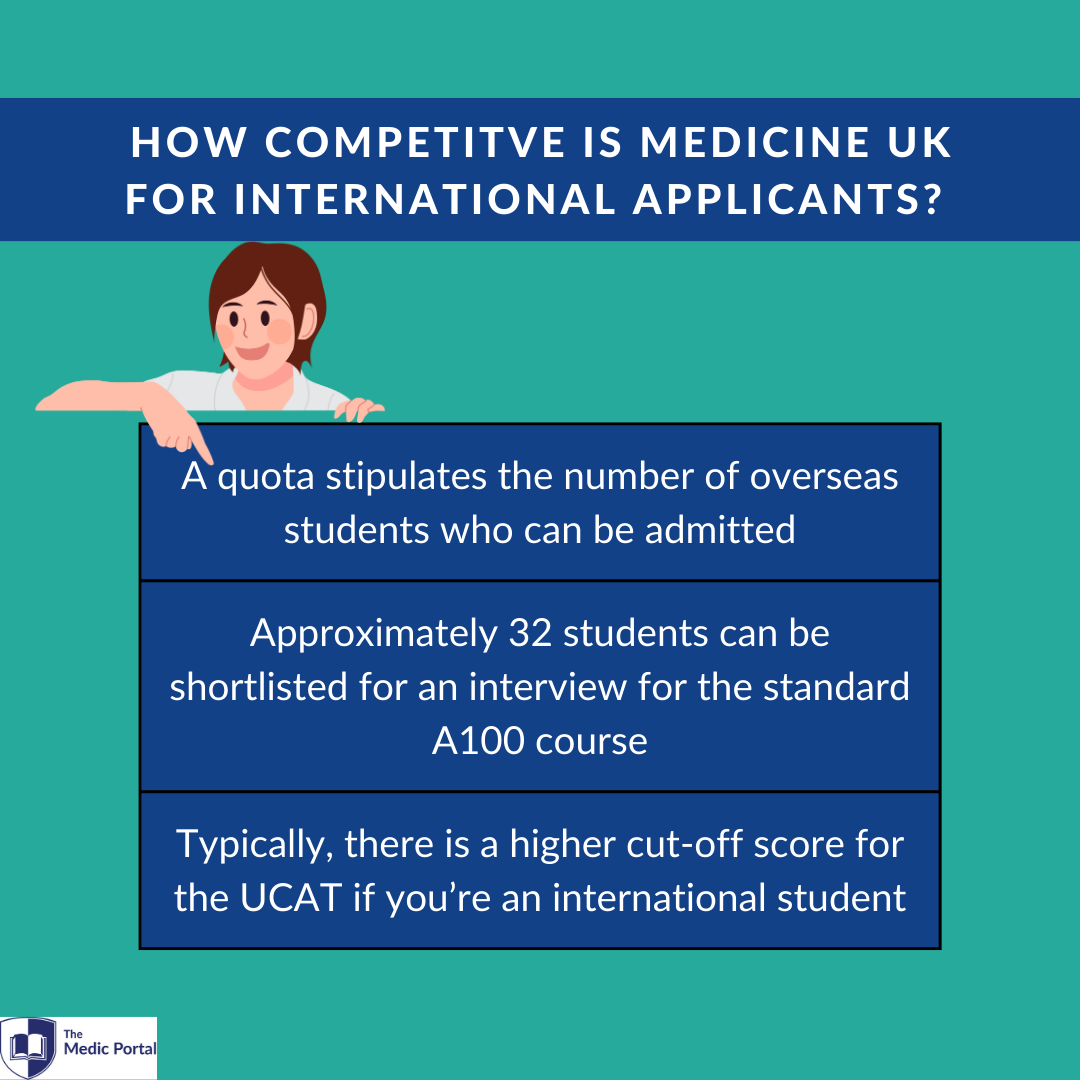Applying To Study In The UK As An International Student
Applying to study Medicine in the UK as an international student can be an exciting yet daunting prospect! You should understand the specific requirements and considerations involved in the application process, as well as carefully select medical schools when you know little to nothing about the country you’re applying to!
But don’t worry – we’ve got your covered. When choosing your school and course, consider factors such as entry requirements, including academic qualifications and English language proficiency tests, as well as any additional documentation needed for international applicants.
You can also use our comparison tool to check and compare detailed entry requirements between medical schools and courses.
Note: Most universities also specify age requirements for its applicants, so don’t forget to check that in advance. Remember that application deadline may also vary for international students.
You will have to apply via UCAS, (Universities and Colleges Admissions Service), the central application system for undergraduate medical programs. The 2023 application deadline for Medicine course was 16th October, and it’s unlikely to significantly change in 2024, but make sure to check in advance.
Remember to plan ahead, stay organized, and allow yourself ample time to gather all the necessary documents, including personal statements, reference letters, and transcripts.

Can International Students Apply For Funding?
EU students are eligible for tuition fee loans (if you’re doing your first higher education qualification) but not maintenance loans or maintenance grants. Students from outside the EU cannot apply for any loans or grants.
Individual institutions charge varying amounts of tuition fees for international students, but there is also a variety of available grants.
What Else Do International Applicants Need To Consider?
If you think you can fund your degree in the UK, then here are some important things to consider.
Firstly, it is crucial to carefully research and understand the visa requirements and application process. Depending on your country of origin, you may need to apply for a student visa or other relevant immigration documentation.
Financial planning is another crucial aspect for international applicants. Consider the cost of tuition fees, accommodation, living expenses, and any additional expenses such as health insurance. Explore scholarship opportunities and funding options available for international students.
You’re also required to take the UCAT as an EU or international student. There are test centres around the world, so if you know you’ve got to take the test, then find a centre through their websites as early as possible.
There are some foundation courses designed specifically to help overseas students transition into courses at UK Medical Schools, which might be a good option if you’re worried you might miss the entry requirements.
Is Medicine More Competitive For International Applicants?

There is a quota stipulating the number of overseas students who can be accepted by UK universities.
In general, the number of international students shortlisted for interview is restricted to approximately 32 for the standard A100 course. Cardiff medical school, for example, specifies that the 7.5% cap on overseas places means that they have around 25 places in year 1. This can make the process very competitive.
When it comes to what you should aim for in terms of the UCAT scores, this will depend on each year’s cycle and competitiveness of the pool of applicants.
For example, for the 2023 cycle, Queen Mary University of London had a UCAT cut-off score of 2720 for home students and 2870 for overseas students.
In turn, the cut-off score for BMAT (discontinued from 2024) was 10.1 for home applicants and 13.1 for oversees applicants in UCL’s 2023 application cycle.
What Happens After I Get My Place?
You’ll need to arrange things like a student visa (If you’re from outside the EU) and accommodation in the UK.
Unless you are studying a short course or are under 17 years old, you will be applying for the Tier 4 (General) student visa. You can apply for your visa up to 3 months before the start of your course.
5 Tips for International Applicants to UK Medical School
Michele applied as an international student to UCL. Here are her top tips for international students:
Familiarise yourself with UCAS

All medicine applications in the UK must be placed through an organisation known as the Universities and Colleges Admissions Service (UCAS). Once you have created an account online, you will be able to enter up to five university choices, with a maximum of four being Medicine.
You will also need to write a personal statement and have a reference from your current school.
In some countries, you are allowed to submit different personal statements to each university. However, this is not the case in the UK.
As UCAS is a centralised system, you will only be able to upload one personal statement that will be seen by all your universities – this is definitely something to keep in mind while you are writing it.
The deadline for submitting your UCAS form is October 16th for all Medicine applications.
Obtain work experience

Work experience forms an integral part of your application; it is something worth mentioning in your personal statement, as well as a great topic of discussion in interviews.
It is understandably difficult for international students to find work placements in the UK, especially if you live in a different country. Don’t worry, people who read your application will also be aware of this.
My advice would be to start early and plan ahead; Focus on getting more long-term experience from your home country – for example, volunteering at a local hospice, and perhaps try to search for a short hospital placement over in the UK during the holidays.
Plus, while you are over, it would also be the perfect opportunity to visit a few universities you are interested in applying for.
Read about the NHS and current affairs

Although you might not live in the UK, you will be expected to know about the healthcare system and to discuss the latest news and controversies during interviews. In particular, knowing about their National Health Service (NHS) is crucial.
I would suggest finding out how and why the NHS was launched, its core principles, values, and obstacles they are facing at the moment. It is also worth keeping up to date with medical news.
I know this might seem like a difficult and laborious task, but remember, you don’t have to learn any of this off by heart, nor do you have to acquire all this information in one day. It’s about finding topics and news articles that you are interested in, or are passionate about.
Perhaps simply start by making a habit of reading BBC news for 10 minutes when you wake up in the morning or before you go to bed, and you will soon become up-to-date with current affairs.
Be prepared to fly over for interviews

Now that you have submitted your application on UCAS, and taken the aptitude tests you need (I personally think this is the toughest part), you may start to hear back from universities inviting you over for interviews.
A few universities would ask you in advance to provide dates that you are definitely not available for. However, other universities tend to simply allocate a specific date and time, and would rarely allow for rescheduling.
Therefore it’s definitely worth looking up each university’s interview dates in advance to make sure it does not clash with anything important such as your school exams.
It would also be worth checking if your chosen university conducts interviews closer to your own country (for example, Singapore if you live in Hong Kong), which would save quite a lot of travelling time!
